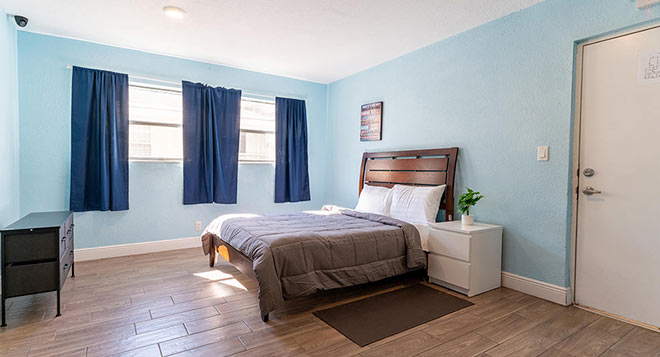your new life starts here
Take the crucial first step towards Lasting Peace & Tranquility
Florida behavioral mental health facility admissions frequently asked questions
Pricing
Often, people hesitate to seek help, worried about the potential high costs. However, the long-term costs of untreated mental health issues can be even greater.
Here are some consequences of not treating mental health conditions:
- Impact on career or earnings
- Strained or broken relationships
- Legal issues
- Financial difficulties
- Long-term health complications
- Harm to personal reputation
- Lost opportunities in different aspects of life


MENTAL HEALTH TREATMENT IN FORT LAUDERDALE, FL
At Still Mind, we value transparency. We'll guide you through the process, ensuring you have all the information you need to make an informed decision about your residential treatment costs.
MENTAL HEALTH TREATMENT insurance coverage
What Is Covered in Your Cost for Residential Treatment?
When considering residential treatment for mental health disorders, it’s important to have an understanding of your total cost. Residential treatment provides support from a team of professionals including medical staff, therapists, and other specialists who provide round-the-clock care in a safe and supportive environment.
At Still Mind Behavioral Mental Health Facility we designed to make the recovery journey as comfortable as possible while providing the highest quality of care.
Your cost for residential treatment can include an upfront fee for admission and housing costs, as well as ongoing fees for medical services such as medication management, individualized counseling and group therapy sessions.
At Still Mind, we understand that selecting a place you want to recover is an important decision. Our experienced intake staff will help guide you through the admissions process so that you have a clear understanding of what is covered in your cost for residential treatment.
Paying for treatment doesn’t have to be a stressful experience. Private insurance is often the best option, as many employer-provided plans cover most of the costs associated with rehab. If this isn’t an option, there are still ways to pay for treatment.

Luxury Mental Health Treatment in Florida
At Still Mind Mental Health, we offer comprehensive mental health treatment services. Our dedicated team provides 24/7 medical monitoring and utilizes evidence-based therapies like cognitive-behavioral therapy (CBT) to address various mental health conditions. Additionally, we incorporate holistic approaches, including yoga, mindfulness practice, and nutrition counseling, to support overall well-being.
Is Mental Health Treatment Worth the Cost?
Mental health treatment is healthcare, so it follows that it would carry a similar cost. In essence, mental health concerns can be expensive but the question remains whether it is actually worth it.
When you take into consideration the costs associated with a mental health issue when left untreated (physical, mental, and financial) the answer becomes clear—yes.
Mental health concerns impact employment and can even lead to imprisonment, which are costly outcomes. Another thing to consider is how active mental health issues can spur disease and/or exacerbate an existing medical condition, which leads to increased costs for medical care.
When you enter into and remain in treatment, you will begin to make occupational and social gains. For instance, treatment can reduce criminal activity and limit exposure to the criminal justice system. A stay in treatment can also result in improved job prospects, social, and psychological functioning.
Does Insurance Cover Mental Health Treatment?
Absolutely. Most private insurance carriers offer coverage for mental health recovery services. The amount of coverage you are entitled to will depend on factors such as treatment needs, level of insurance coverage, and the particular treatment facility you plan on attending.
To best determine what level of coverage you can get for treatment, it is best to talk with one of our intake coordinators.
Paying For Treatment Without Insurance
What Does My Insurance Cover?
What Length of Treatment Will My Insurance Cover?
Depending on your insurance plan, your carrier may cover the entire length of your treatment.
However, some plans will only cover a certain amount of days. This situation can be an obstacle if your mental health requires a longer residential stay.
What you should know is that when it comes to mental health treatment, what matters are the quality of services, available treatment plans, level of credentialed staff, reputation, and the facility’s track record of success.
Are my coverage and treatment confidential?
Yes, it is. Many people who struggle with substance abuse are hesitant to take time off work for detox and inpatient care due to privacy concerns. However, the 42 Code of Federal Regulations ensures that the privacy of all substance abuse patients is protected at facilities that receive federal government aid.
In addition, the state of Florida has comprehensive privacy laws for individuals receiving mental illness treatment. Without your written consent, no one will be able to access information about your condition or treatment plan.
Is Dual Diagnosis Treatment Covered by Insurance?
Insurance coverage for mental health and addiction treatment has historically been inadequate compared to coverage for physical health issues. However, in recent years, the Mental Health Parity and Addiction Equity Act of 2008 has led to significant changes in the insurance industry’s approach to mental health coverage.
Dual diagnosis treatment, which addresses both mental health and addiction issues, may be covered by insurance depending on the individual policy and provider.
Is The Parity Law Applicable to All Mental Health Diagnoses?
The federal parity law is more comprehensive than some state laws as it applies to all mental health issues covered by a health plan. However, it’s important to note that some health plans may exclude certain diagnoses, both physical and mental/behavioral. Your insurer is obligated to inform you of any exclusions in advance. If you are unsure whether a particular diagnosis is covered under your mental health insurance plan, it’s best to ask your provider upfront.
How to Use My Insurance for Mental Health Treatment?
To ensure that you have a clear understanding of your mental health insurance coverage, it’s best to consult your insurance provider or HR department for specific details. During the discussion, keep the following points in mind:
Check if your insurance company requires copayments, which are out-of-pocket expenses for the client.
Inquire about your deductibles, which are amounts that you must pay out-of-pocket before your insurance provider releases payment on claims.
Check what out of network benefits are available because usually these can be used for a luxury treatment experience
By educating yourself on these basic factors, you can make informed decisions about paying for mental health treatment. Remember that there are numerous options available, including private and government-funded programs, to provide you with the necessary funding and support in your journey towards recovery.
For more information about your insurance coverage and treatment options, please contact our admissions staff today.
What to Bring to Rehab ?
- Your insurance card
- Official form of ID (State ID, Driver’s License, Passport, etc.)
- All prescription medications
- Inhaler for respiratory conditions, Epi-pens, Insulin pens, other specialized medications. Speak with staff before bringing.
- Your checkbook, credit card or debit card to pay for treatment incidentals. We require a credit card to be put on file for pharmacy copays. Additionally, if you need nicotine products or toiletries, we have them available for purchase.
- A list of names, addresses and phone numbers of those individuals or organizations you wish to have involved in your treatment (loved ones, healthcare providers, sponsor, employer, etc.)
Healing from Within: Still Mind, Your Path to Mental Wellness
Approved items
clothing items
The following clothing items are approved.
Jeans, casual slacks, skirts, and dresses (knee-length or longer), jogging suits, and appropriate-length shorts such as Bermuda/walking shorts
T-shirts, oxford shirts, tank tops (no spaghetti straps)
Non-revealing workout clothing– Our amenities include indoor and outdoor activities year-round.
Yoga clothes
Shoes: comfortable everyday shoes, tennis/athletic shoes for activities, slippers, flip-flops for shower usage.
Swimwear:
For Men – Trunk style
For Women – No low cut, thong, or revealing tops
Socks
Undergarments
Pajamas
Light jacket/sweater
Coat/Jacket during the winter season
Bath Robe
Clothing referencing drugs, alcohol, sex, gambling, or gangs is strictly prohibited.
Personal Hygiene & Beauty Products
You should bring the usual toiletries and hygiene products that you use daily.
All items must be alcohol-free.
If the item has alcohol as an ingredient, leave it at home.
No aerosol products.
Your toiletries should include items such as the following:
Deodorant
Toothbrush and toothpaste
Shampoo and conditioner
Hair Styling products (pump spray only)
Comb/Brush
Feminine Hygiene Products
Shaving cream
Lotion
Sunscreen (not spray)
Makeup
Hair dryer
Hair curling irons, flat iron, curlers, etc.
Razors and tweezers
Miscellaneous Items
Appropriate reading material (no pornographic reading material)
Pictures of supportive loved ones (without frames)
Pillow
The following items will be kept locked in a safe and secure area, and can only be utilized with approval by the treatment team:
Cell phone
Laptop/tablet
Money
Wallet/Purse
Can I Smoke Cigarettes?
If you smoke, Still Mind allows you to bring cigarettes and electronic cigarettes during designated times.
The following items are allowed:
Cigarettes
Electronic Cigarettes / Vape Apparatus
– Mods only
Vaping juice (sealed only)
Items We Request You Leave at Home
To ensure your safety and create the best therapeutic environment we ask that you refrain from bringing the following:
- Drugs and/or alcohol
- Any items with alcohol
- Over-the-counter Medications
- Vitamins
- Smart Watch/Fitbit
- Weapons – (guns, knives, scissors, sharp objects, etc.)
- Pornography
- Food or drink (including protein powder)
- Matches
- Nail polish, polish remover
- Iron/steamer
- Flashlights, night lights, etc.
- Sporting/Exercise equipment
- Camera, video recording, audio equipment
- Sexual devices
- Flushable wipes
- Alarm clocks, radio (both are provided)
- Aerosol items
- Cleaning supplies
- Electronics (other than those listed as approved above)
- Candles and incense
- Space heaters
- Any home appliances (fans, lamps, furnishings, etc.)









